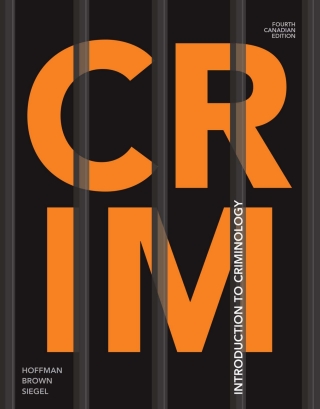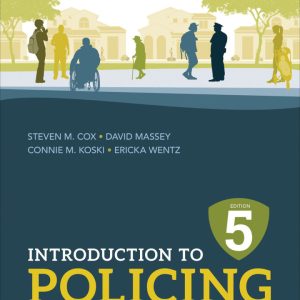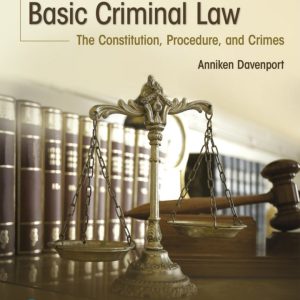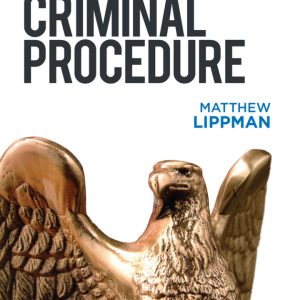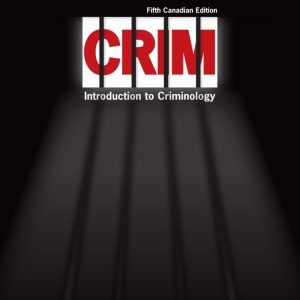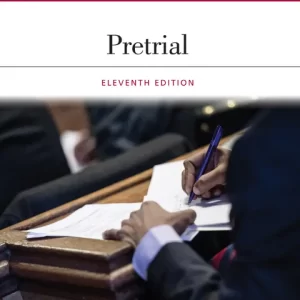Buy CRIM: Introduction to Criminology, 4th Edition PDF ebook by author Ron Hoffman, Gregory P. Brown, Larry J. Siegel – published by Cengage Learning Canada Inc. in 2021 and save up to 80% compared to the print version of this textbook. With PDF version of this textbook, not only save you money, you can also highlight, add text, underline add post-it notes, bookmarks to pages, instantly search for the major terms or chapter titles, etc.
You can search our site for other versions of the CRIM: Introduction to Criminology, 4th Edition PDF ebook. You can also search for others PDF ebooks from publisher Cengage Learning Canada Inc., as well as from your favorite authors. We have thousands of online textbooks and course materials (mostly in PDF) that you can download immediately after purchase.
Note: e-textBooks do not come with access codes, CDs/DVDs, workbooks, and other supplemental items.
eBook Details:
Full title: CRIM: Introduction to Criminology, 4th Edition
Edition: 4th
Copyright year: 2021
Publisher: Cengage Learning Canada Inc.
Author: Ron Hoffman, Gregory P. Brown, Larry J. Siegel
ISBN: 9780176913878, 9780176913922, 978-0176913878, 978-0176913922
Format: PDF
Description of CRIM: Introduction to Criminology, 4th Edition:
Created through a “student-driven, faculty-approved” review process, the fourth Canadian edition of CRIM is an engaging and accessible learning solution designed to accommodate the diverse learning and lifestyles of today’s students. CRIM features an engaging layout, relevant and concise criminology and criminological theory content, and a personal tone. In the fourth Canadian edition, updates have been made to include current events and expanded information of career opportunities relevant to the Canadian criminology student. Bring Criminology to life for your students with CRIM!
Table of Contents of CRIM: Introduction to Criminology, 4th Edition PDF ebook:
Brief ContentsContentsPrrefaceVisual WalkthroughChapter 1: Crime and CriminologyIntroductionIntroduction to CriminologyA Brief History of CriminologyContemporary CriminologyWhat Criminologists Do: The Criminological EnterpriseDeviant or Criminal – How Criminologists Define CrimeCrime and Criminal LawCommon LawThe Elements of a CrimeEthical Issues in CriminologySummaryChapter 2: The Nature and Extent of CrimeIntroductionPrimary Sources of Crime StatisticsEvaluating Crime DataCrime TrendsCrime PatternsSocial Class and CrimeAge and CrimeGender and CrimeRace and CrimeComputerized Crime Mapping in Policing and Criminological TheorySummaryChapter 3: Victims and VictimizationIntroductionDefining VictimologyProblems of Crime VictimsThe Nature of VictimizationTheories of VictimizationCaring for the VictimVictims’ Services ProgramsAdvocacy for Victims’ RightsEfforts to Avoid VictimizationSummaryChapter 4: Choice Theory: Because They Want ToIntroductionThe Development of Rational Choice TheoryThe Concept of Rational ChoiceWhy Do People Commit Crimes?Situational Crime PreventionGeneral DeterrenceSpecific DeterrenceIncapacitationPolicy Implications of Choice TheorySummaryChapter 5: Trait Theory: It’s in Their BloodIntroductionThe Development of Trait TheoryContemporary Trait Theory in CriminologyBiological Trait TheoriesPsychological Trait TheoriesMental Disorder and CrimeEvaluation of Psychological Trait TheorySummaryChapter 6: Social Structure TheoriesIntroductionCriminologists and SociologyEconomic Structure and CrimeSocial Structure TheoriesSocial Disorganization TheoryStrain TheoriesCultural Deviance TheoryTheory of Differential OpportunitySummaryChapter 7: Socialization and CrimeIntroductionSocialization and Social ProcessCritical Elements of SocializationSocial Process Theory: Social Learning Theory, Social Control Theory, and Social Reaction TheorySocial Learning TheoriesSocial Control TheorySocial Reaction (Labelling) TheoryAn Evaluation of Social Process TheorySocial Process Theory and Social PolicySummaryChapter 8: Social Conflict Theory: Power, Privilege, and Social JusticeIntroductionThe Conflict Theory of CrimeRadical (Marxist) TheoryEmerging Forms of Critical CriminologyCritical Theory and Social Justice in CanadaSummaryChapter 9: Integrated TheoriesIntroductionLatent Trait TheoriesControl Balance TheoryDevelopmental TheoryTheories of Criminal DevelopmentThe Future of Criminological TheorySummaryChapter 10: Violent CrimeIntroductionTypes of Interpersonal ViolenceThe Roots of ViolenceRape and Sexual AssaultMurder and HomicideAssaultRobberyContemporary Forms of Interpersonal Violent CrimeSummaryChapter 11: Property CrimesIntroductionHistory of TheftTypes of ThievesTheftBurglary/Break and EnterArsonSummaryChapter 12: White-Collar Crime and Organized CrimeIntroductionEconomic CrimeWhite-Collar CrimeTypes of White-Collar CrimeTheories of White-Collar CrimeControlling White-Collar CrimeOrganized CrimeThe Concept of Organized CrimeSummaryChapter 13: Public Order CrimesIntroductionLaw and MoralityProstitutionPornographyGamblingSubstance AbuseDecriminalization and LegalizationSummaryChapter 14: The Challenge of Crime in the 21st Century: A Global CriminologyIntroductionGlobal CriminologyState CrimeInternational Finance CrimeTransnational Goods CounterfeitingHuman TraffickingCybercrimeTerrorismSummaryNotesIndex

